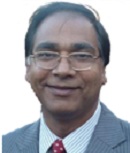
Plenary Lecture
Recent Development in 2nd Generation Biodiesels as Alternative Fuels for Transport Sector

Professor Mohammad G. Rasul
School of Engineering and Technology
Central Queensland University
Australia
E-mail: m.rasul@cqu.edu.au
Abstract: Increase in global energy demand due to increase in population and industrial growth has lead the researchers to look for alternative fuel for transport sector. Among the options, biodiesel has potential to give a solution to the energy concern due to being renewable, biodegradable and environmental friendly nature and have similar properties of fossil diesel. There are three types of biodiesels available, namely 1st generation biodiesel which produces from edible oils; 2nd generation biodiesel which produces from non-edible oils and animal fats, and 3rd generation biodiesel which mainly produces from microalgae. Among the different types of biodiesels, 2nd generation has the better potential as an alternative to petroleum diesel because it does not compete with food vs fuel crisis and it’s feedstocks are available sufficiently and can be grown throughout the year in marginal lands as opposed to fertile land required for growing 1st generation biodiesel feedstocks. On the other hand microalgae biodiesel has limited availability and still in the early stages of development. This presentation will summarize the challenges of producing biodiesel from 2nd generation biodiesels feedstocks and will identify the operating conditions for obtaining optimised and highest oil yield and efficient conversion of bio-oil into biodiesel. An example will be provided on biodiesel production from Australian beauty leaf tree (BLT) (Calophyllum inophyllum). Then, engine performance, combustion and emission characteristics using petroleum diesel and biodiesel-diesel blends of B5, B10 and B20 for different 2nd generation biodiesels, for example BLT biodiesel, poppy and waste cooking mixture biodiesel, jojoba biodiesel, etc, will be presented and evaluated. The test results from 4-cylinder diesel engine dynamometer test-bed running at engine speed from 1200 rpm to 2400 rpm with 200 rpm increment and engine load of 25%, 50%, 75% and 100% will be presented and discussed. The presentation will provide researchers, policy makers and biodiesel manufacturers an understanding of using 2nd generation biodiesel as an alternative source of fuel for diesel engine. Keywords: The 2nd generation biodiesel, Australian beauty leaf tree (BLT) biodiesel, bio-oil extraction, biodiesel production, diesel engine performance, emissions and combustion characteristics.
Brief Biography of the Speaker: Mohammad Rasul has a strong record of research and achievement in the areas of energy and thermodynamics. His first degree is in Mechanical Engineering from Bangladesh University of Engineering and Technology, Bangladesh. He completed his Master of Engineering in Energy Technology from Asian Institute of Technology, Thailand and PhD in the area of energy from the University of Queensland, Australia. Currently, he is an Associate Professor in Mechanical Engineering at School of Engineering and Technology, Central Queensland University. His major research focuses on renewable energy (solar, wind, biomass, agricultural waste, etc), building energy (domestic, institutional and commercial buildings) and industrial energy and thermodynamics (process and resource industries). His achievements, contributions and recognition in research have been strongly demonstrated through creating significant impact and the large number of publications and citations by the relevant professionals, both nationally and internationally. He has published over 380 research articles/papers in journals, conferences and book chapters. He has also edited three books and currently editing a book on Clean Energy for Sustainable Development. One of his journal papers and three of his conference papers has been awarded the best paper award. His publications have attracted significant interest within scientific and professional communities with about 1700 citations and h-index of 18 (in Scopus). He has supervised 23 Research Higher Degree (RHD) students (Research PhD and masters) to completion. Currently he is supervising 7 PhD students. His external and internal grant funding has totaled more than $2.9 million. Professor Rasul has been leading and contributing to the strategic research on Clean and Sustainable Energy Technologies, and Thermodynamics.